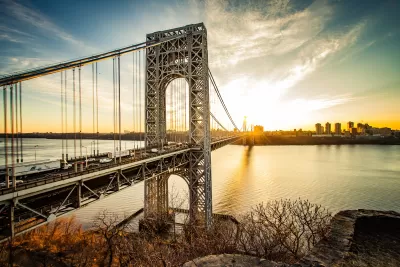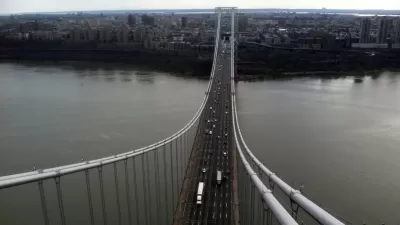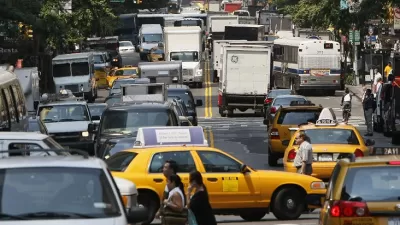The State of New Jersey filed a federal lawsuit against the U.S. Department of Transportation on Friday to halt the Manhattan cordon pricing project approved in June by the FHWA, charging that they violated the National Environmental Protection Act.

“On Friday, the state filed a lawsuit against the U.S. Department of Transportation (USDOT) and the Federal Highway Administration (FHWA) to block what it describes as ‘the ill-conceived congestion pricing plan,’” reported Matthew Fazelpoor for NJBIZ, the state's leading business journal. More details have emerged since Planetizen first covered the story.
When the FHWA cleared the controversial pricing project last month, “New Jersey leaders noted they had retained Randy Mastro and Craig Carpenito of law firm King & Spalding and were exploring all legal options,” added Fazelpoor. “And on Friday, the state did indeed take legal action.”
The suit argues that the USDOT and the FHWA violated the National Environmental Protection Act, which requires a full environmental impact review for efforts of this projected impact and scope, as well as the Clean Air Act.
Tolls, not environment, prompts lawsuit
“We believe the feds short-circuited the normal review process,” Democratic Gov. Phil Murphy said in an interview on Good Day New York, reported Jimmy Vielkind for The Wall Street Journal on July 21.
Murphy argued that the new tolls will unfairly target New Jersey drivers, who already pay a $17 toll to use the Lincoln or Holland tunnels into Manhattan. Around 111,000 people drove into Manhattan’s business district from New Jersey on an average fall weekday in 2019, according to the New York Metropolitan Transportation Council, a planning group.
“We can’t fix a broken MTA [Metropolitan Transportation Authority] in New York City on the back of New Jersey commuters,” states Murphy on pg. 2 of the 68-page lawsuit [pdf]. “It’s a huge tax on them, and frankly, it challenges our environment because of all the re-routing of traffic that will take place.”
The current plan allows for a peak-hour toll as high as $23 for drivers who enter the cordon below 60th Street in Manhattan. An alternative plan, posted here July 18, would set the maximum at $15.
“Lisa Daglian, who heads an advisory committee that advocates for MTA riders, said most New Jersey residents who commute to Manhattan come on trains or in buses and many of them then ride the subway,” added Vielkind.
“We strongly condemn this lawsuit for its attempt to halt progress on improving transit, reducing congestion and pollution, and creating a healthier and more sustainable region,” she said.
The road pricing program, scheduled to take effect next year, could mean billions of dollars in new transit funding for the MTA.
Additional coverage in Bloomberg City Lab: “New Jersey Sues Over Congestion Pricing Plan in New York City,” July 21, 2023
FULL STORY: New Jersey files federal lawsuit to block congestion pricing in NYC

Study: Maui’s Plan to Convert Vacation Rentals to Long-Term Housing Could Cause Nearly $1 Billion Economic Loss
The plan would reduce visitor accommodation by 25,% resulting in 1,900 jobs lost.

North Texas Transit Leaders Tout Benefits of TOD for Growing Region
At a summit focused on transit-oriented development, policymakers discussed how North Texas’ expanded light rail system can serve as a tool for economic growth.

Using Old Oil and Gas Wells for Green Energy Storage
Penn State researchers have found that repurposing abandoned oil and gas wells for geothermal-assisted compressed-air energy storage can boost efficiency, reduce environmental risks, and support clean energy and job transitions.

Santa Barbara Could Build Housing on County Land
County supervisors moved forward a proposal to build workforce housing on two county-owned parcels.

San Mateo Formally Opposes Freeway Project
The city council will send a letter to Caltrans urging the agency to reconsider a plan to expand the 101 through the city of San Mateo.

A Bronx Community Fights to Have its Voice Heard
After organizing and giving input for decades, the community around the Kingsbridge Armory might actually see it redeveloped — and they want to continue to have a say in how it goes.
Urban Design for Planners 1: Software Tools
This six-course series explores essential urban design concepts using open source software and equips planners with the tools they need to participate fully in the urban design process.
Planning for Universal Design
Learn the tools for implementing Universal Design in planning regulations.
Ascent Environmental
Borough of Carlisle
Caltrans
Institute for Housing and Urban Development Studies (IHS)
City of Grandview
Harvard GSD Executive Education
Toledo-Lucas County Plan Commissions
Salt Lake City
NYU Wagner Graduate School of Public Service





























